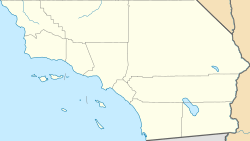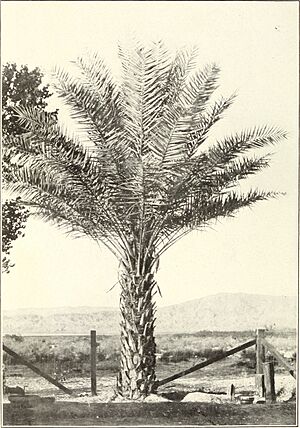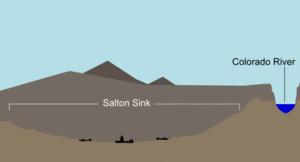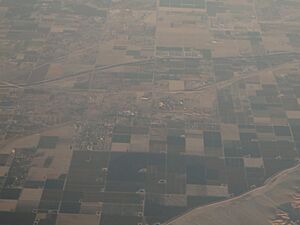Mecca, California facts for kids
Quick facts for kids
Mecca
Walters
|
|
|---|---|
|
1904 Drawing of Mecca, CA
|
|
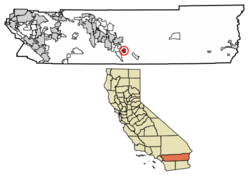
Location in Riverside County and the state of California
|
|
| Country | |
| State | |
| County | Riverside |
| Settled | 1870's |
| Named for | Mecca, for its climate |
| Area | |
| • Total | 6.959 sq mi (18.023 km2) |
| • Land | 6.959 sq mi (18.023 km2) |
| • Water | 0 sq mi (0 km2) 0% |
| Elevation | -187 ft (−57.0 m) |
| Population | |
| • Total | 8,219 |
| • Density | 1,181.06/sq mi (456.03/km2) |
| Time zone | UTC-8 (Pacific) |
| • Summer (DST) | UTC-7 (PDT) |
| ZIP code |
92254
|
| Area codes | 442/760 |
| FIPS code | 06-46660 |
| GNIS feature IDs | 1652751 and 2408811 (CDP) |
Mecca is a small community in Riverside County, California, USA. It's not an official city, but a place where people live and work. Mecca is in the desert, right by the northern part of the Salton Sea. It is surrounded by farms in the Eastern Coachella Valley.
Contents
Geography and Climate
Mecca is in the Colorado Desert, which means it has a very dry desert climate. The average temperature is about 90°F (32°C). However, temperatures can drop to around 20°F (-7°C) in winter. The community is located about 150 feet (46 meters) below sea level, close to the Salton Sea.
Long ago, people tried to bring water from the Colorado River to grow crops in the desert. But in 1905 and 1906, too much snow melted, and the river accidentally changed its path. This caused a huge flood that created the Salton Sea. This new sea covered old salt mines that had been used for hundreds of years. Today, water from underground and the Coachella Canal helps turn the desert into farmland.
| Climate data for Mecca, California (1991–2020 normals, extremes 1905–2019) | |||||||||||||
|---|---|---|---|---|---|---|---|---|---|---|---|---|---|
| Month | Jan | Feb | Mar | Apr | May | Jun | Jul | Aug | Sep | Oct | Nov | Dec | Year |
| Record high °F (°C) | 93 (34) |
100 (38) |
107 (42) |
110 (43) |
119 (48) |
126 (52) |
125 (52) |
123 (51) |
126 (52) |
117 (47) |
100 (38) |
91 (33) |
126 (52) |
| Mean maximum °F (°C) | 82.5 (28.1) |
87.2 (30.7) |
93.8 (34.3) |
100.9 (38.3) |
107.5 (41.9) |
113.3 (45.2) |
116.5 (46.9) |
116.8 (47.1) |
113.5 (45.3) |
103.9 (39.9) |
92.0 (33.3) |
81.8 (27.7) |
119.1 (48.4) |
| Mean daily maximum °F (°C) | 70.4 (21.3) |
73.9 (23.3) |
80.8 (27.1) |
86.9 (30.5) |
94.6 (34.8) |
102.5 (39.2) |
106.6 (41.4) |
106.2 (41.2) |
101.5 (38.6) |
91.2 (32.9) |
78.0 (25.6) |
68.9 (20.5) |
88.5 (31.4) |
| Daily mean °F (°C) | 57.2 (14.0) |
60.6 (15.9) |
67.3 (19.6) |
73.0 (22.8) |
80.4 (26.9) |
87.4 (30.8) |
93.3 (34.1) |
93.2 (34.0) |
87.6 (30.9) |
76.6 (24.8) |
64.2 (17.9) |
55.5 (13.1) |
74.7 (23.7) |
| Mean daily minimum °F (°C) | 43.9 (6.6) |
47.2 (8.4) |
53.8 (12.1) |
59.2 (15.1) |
66.3 (19.1) |
72.3 (22.4) |
80.0 (26.7) |
80.2 (26.8) |
73.7 (23.2) |
62.1 (16.7) |
50.4 (10.2) |
42.1 (5.6) |
60.9 (16.1) |
| Mean minimum °F (°C) | 29.4 (−1.4) |
33.5 (0.8) |
38.6 (3.7) |
44.3 (6.8) |
51.8 (11.0) |
59.7 (15.4) |
65.2 (18.4) |
65.0 (18.3) |
58.1 (14.5) |
46.7 (8.2) |
35.6 (2.0) |
28.0 (−2.2) |
26.5 (−3.1) |
| Record low °F (°C) | 13 (−11) |
19 (−7) |
23 (−5) |
34 (1) |
38 (3) |
48 (9) |
53 (12) |
51 (11) |
45 (7) |
28 (−2) |
24 (−4) |
18 (−8) |
13 (−11) |
| Average precipitation inches (mm) | 0.60 (15) |
0.56 (14) |
0.32 (8.1) |
0.17 (4.3) |
0.01 (0.25) |
0.00 (0.00) |
0.21 (5.3) |
0.08 (2.0) |
0.30 (7.6) |
0.23 (5.8) |
0.20 (5.1) |
0.37 (9.4) |
3.05 (77) |
| Average precipitation days (≥ 0.01 in) | 2.8 | 1.6 | 1.1 | 0.5 | 0.2 | 0.0 | 0.5 | 0.6 | 0.7 | 0.7 | 0.7 | 1.4 | 10.8 |
| Source: NOAA (mean maxima/minima 1981–2010) | |||||||||||||
Community Landmarks
The most important building in Mecca is the Mecca Family and Farm Worker's Service Center. This center was built in 2005. It has a health clinic and a day care center. It also helps people find government services. Many people in Mecca work on farms, so this center is very important to them.
After the Service Center was built, the county added more buildings. The Mecca-North Shore Community Library and the Mecca Fire Station both opened in 2011.
Also in 2011, the Boys & Girls Club of Coachella Valley opened a large club in Mecca. It is next to the Community Service Center. This club helps about 350 children from Mecca and nearby areas.
History of Mecca
Early Inhabitants: The Cahuilla People
For many years, the Cahuilla people lived in the Coachella Valley. They traveled on an old trail called the Cocomaricopa/Halchidoma Trail. This trail passed just south of where Mecca is today.
Spanish Explorers and Legends
In December 1540, Melchior Diaz was the first non-native person to explore inland California. He was near the Imperial Valley, about 95 miles southeast of Mecca.
There's a local story about Juan de Iturbe's Lost Pearl Ship. People say that after a big flood in 1862, an old Spanish ship was seen. It was supposedly beached near Salt Creek (Salton Sea), south of Mecca. This ship was from 1615, when the area was part of a large ancient lake called Lake Cahuilla.
In 1774, Juan Bautista de Anza led an expedition through the Imperial Valley. He met the native Cahuilla people, making him the first Spaniard to contact them. Later, Spanish missionaries from Los Angeles traveled to collect salt from pools near the northern Salton sink.
Mexican Expedition of 1823
In 1823, Captain José Romero and José María Estudillo explored the Coachella Valley. They followed the Halchidoma Trail and were guided by the Cahuilla people. They reached Dos Palmas Spring near Mecca on December 31, 1823.
The Bradshaw Trail
In 1862, William D. Bradshaw created the Bradshaw Trail. This trail connected gold mines in Arizona to Los Angeles. It followed the old Halchidoma Indian Trail. Many travelers used this trail to go between Arizona and California. Later, railroads replaced the stagecoach trail in the late 1870s.
The Southern Pacific Railroad and Walters Station
The Southern Pacific Transportation Company built a railroad connecting Yuma to Los Angeles. It was finished in 1869. A train station called Walters was built, and soon, the town of Mecca started to grow in the 1870s.
Date Palms in the Desert
In the late 1890s, Date Palm trees were brought to the Coachella Valley. They grew very well in Mecca because the climate was similar to their native home in the Middle East.
The Creation of the Salton Sea
From 1905 to 1907, the Colorado River flooded into the Salton Sink. This area had been a lake many times before. This flood was an accident caused by engineering problems, and it created the modern Salton Sea. The floodwaters came close to Mecca but did not reach the town itself.
Hurricane Kathleen's Impact
On September 7, 1976, a hurricane called Kathleen hit the Coachella Valley. This storm and other floods in the 1980s slowed down growth in the eastern Coachella Valley. Today, Mecca is known as an important farming center for the region.
Population and Community Life
In 2020, the population of Mecca was 8,219 people. Most of the people living in Mecca are of Hispanic or Latino background.
Many families in Mecca have children. The average household has about 4 to 5 people. The community is quite young, with many residents under the age of 18.
About half of the people in Mecca work in agriculture. The population can change throughout the year. Up to 5,000 extra seasonal farmworkers come to Mecca for the winter and summer harvests.
Mecca has an elementary school, but there isn't a public high school. Some residents continue their education after high school, but fewer have college degrees compared to other parts of the United States.
See also
 In Spanish: Mecca (California) para niños
In Spanish: Mecca (California) para niños
 | Valerie Thomas |
 | Frederick McKinley Jones |
 | George Edward Alcorn Jr. |
 | Thomas Mensah |


